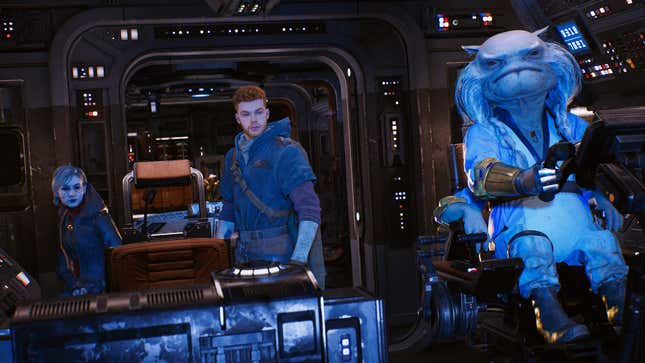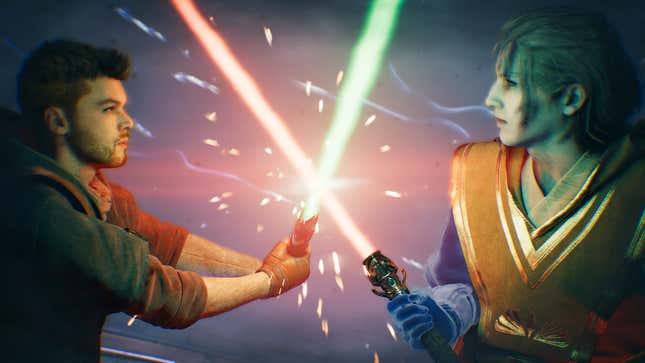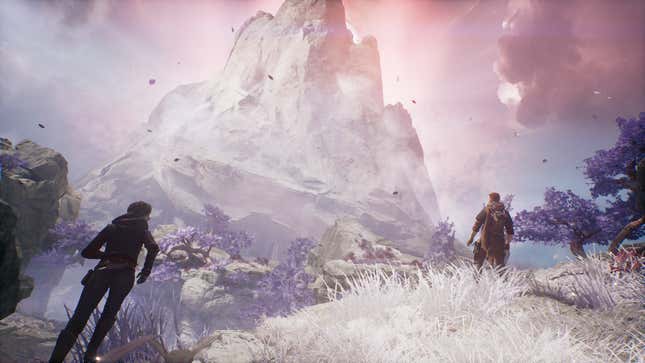This year has been jam-packed with new Star Warswith three new seasons of TV in Bad Batch, The Mandalorianand Ahsokaand oodles of books and comics that saw us revisit legends or the High Republic. Even as we await its return to the big screen, Star Wars remains ever-present—but one new story in particular fulfilled the promise of connecting points across this vast galaxy this year more than anything else: Eat Survivor.
As a standalone piece of Star Wars, Eat Survivor proudly stands on its own two feet. In a compelling exploration of what five more years under the grip of the Empire could do to the characters we first met in Respawn’s initial title in the series, Jedi: Fallen Order weaved together an excellent character piece examining the different ways survival and resistance spoke to the likes of Cal, Merrin, Greez, and Cere. It added a complex and interesting new foil to Cal in Bode Akuna, the charming smuggler hiding a dark path paralleling Cal’s own growing up from the fires of the Clone War to the life of a Jedi on the run.

It took, and ran with, all the great mechanical elements Fallen Order established in offering a new kind of take on a lightsaber combat game—a little bit of Dark Souls-ian influence here, a little Jedi Knight and Jedi Academy there—and a series of worlds to explore to create a game that built on the promise of its predecessor and gave us a bigger, more expansive, and complex experience. It also, and this cannot be emphasized enough, is the best Star Wars dolly dress-up game we’ve gotten in years.
All these things are good, but what makes Eat Survivor shine so brightly is that it’s the biggest piece of new Star Wars we’ve gotten in this age of the new, all-connected, all-canonical era of Star Wars storytelling that really feels like it’s in conversation with, and building on, all these connections across generations of Star Wars tales—and tying them together in a way that feels like they’re really all part of the same universe we’ve seen over a time frame of not just decades, but hundreds of years.

The “Rise of the Empire” era between Revenge of the Sith and A New Hope is the most well-trod ground in continuity for good reason. It offers a way to bridge together those original films and prequels more cohesively, and a little beyond that in the timeline; rarely can you watch an episode of The Mandalorian without a character who first appear in an animated series released a couple decades prior showing up. But what Survivor did was not just simply cameos and Easter egg references to the Star Wars beyond its immediate tale and time frame, but delicately weave parts of that history, and nods to the stories that came after it, in such a way that it felt exactly like that: engaging with history, instead of there being otherwise largely isolated pockets of Star Wars that ostensibly co-exist, but rarely deeply intertwine.
It was as perhaps a surprise to many when Survivor first launched to see just how important the era of the High Republic was going to be to this chapter of Cal Kestis’ story. After all, it was never touched on in Fallen Ordersimply because, well, the High Republic publishing initiative didn’t actually exist publicly when it was released. It’s a testament to Survivor’s writing and ideas, then, that its major presence both in the worldbuilding and directly to Cal’s own journey feels so effortlessly natural, like, of course, these characters and this universe have always been able to reckon with a status quo that existed hundreds of years prior to their own. Beyond giving Cal new locales to explore, and parallels to his own history as a Jedi—as he seeks to try and re-examine and evolve what that means outside of the context of the Jedi Order as he knew it existing—it also gave us a fascinating further foil for him in the fallen Jedi Dagan Gera, a time-strewn survivor of this supposed golden age for the Order.

Star Wars tells a lot of stories about Jedi, but Gera’s is one of its most fascinating. Having survived the 200-plus-year gap between the eras of the High Republic and the rise of the Empire through bacta stasis, he has a unique perspective on the moment in time he finds himself awoken in—and what it means when we as players, and Cal alike, discover that Gera was already well on the way to falling to the Dark Side even before the Jedi Order’s hubris laid it low against Palpatine’s machinations. Again, a fallen Jedi driven by the trauma and impact of experiencing the horrors that transformed their entire worldview during a grand conflict is nothing new to Star Warsbut Gera offers a mirror to an archetype we’ve seen plenty enough of in the wake of the Clone War.
Much of Eat Survivor’s broader tale is about a race to find the planet Tanalorra hidden world largely isolated from the galaxy by an expansive, difficult-to-navigate region of space known as the Koboh Abyss (yes, like a lot of Star Warsit’s a thing about a map). It’s a place Gera had first found and fought to try and defend, both from raiders and even eventually the Jedi themselves, when the Order withdrew their support for his exploration of the world as a viable safe haven. It makes the planet more than some convenient plot device that Survivor can use to drop off characters who it doesn’t want to kill off but likewise doesn’t want eventually co-existing with the time frame of the original Star Wars movies. What Tanalorr means to both Gera and Cal has parallels—this ultimate safe harbor for those targeted by the great evils of the galaxy—but the context for that meaning, in their places in two very different eras of Star Warsmakes them such a fascinating match for each other.

To Gera, from a time when the Jedi were ostensibly at their highest, most intellectually and spiritually rich, Tanalorr is a reflection of that capability, a home in the galaxy only they could craft. When the Jedi abandon it and its defense, shaken as they are by the ferocity of the Nihil across the nascent expansions of the Republic, it completely breaks him—and that’s why, when he awakens to see the Order gone and an Empire in place of the Republic, he lacks little compassion for what remains. Cal, meanwhile, still grasps with what a Jedi identity actually encapsulates to him, having grown into a man largely outside of the tutelage and guidance of the Order. For Cal, Tanalorr is a reflection of the Jedi ideal in an altogether different way: a selfless act, a safe harbor only people like him can guide others to, so they can flee the persecution that upended his life as the Clone Wars came to an end. In merging these shared traumas the two have around their desire to find the world, Survivor carves out some of its most bittersweet reflections on what it means to be a Jedi, on what the galaxy it lets you play about in has actually been like over cycles of conflict and decay, and how that sweeps up and transforms people.
And it works. Few other parts of Star Wars beyond the High Republic stories themselves have had a chance to play with its setting and its potential since it came out, but Survivor finds a connection to it that makes it feel like it’s been part of this galaxy for much longer than since 2021. That, in and of itself, is meant to be the ideal of what Star Wars has been trying to promise since continuity was reset years before that: a galaxy where tales are told across eons of time, across different perspectives, and with different characters and worlds and conflicts, but still part of this singular, connected universe that feels as rich and as lived-in as we’ve always imagined it to be. That so few major explorations of Star Wars have used that potential to its fullest in the years since might be a disappointment, but at least now it has a hallmark in a story like Eat Survivor to keep reaching for that ideal.
Want more io9 news? Check out when to expect the latest Marvel, Star Warsand Star Trek releases, what’s next for the DC Universe on film and TVand everything you need to know about the future of Doctor Who.







